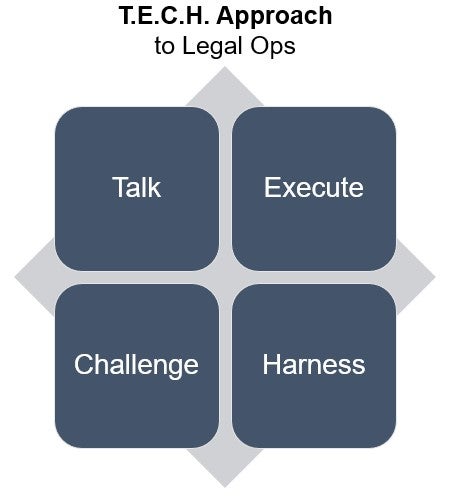
Legal operations is the emerging crossroads of the legal and business functions in corporate legal departments. These specialists oversee the legal department’s processes and technology, knowledge management, financial planning, strategic planning, vendor management, analytics, among other topics. With so many areas to cover, where should legal ops professionals start?
My first six months in my legal operations role at MANN+HUMMEL was charting unknown territory in two terrains: the industry and the company. With few best practices available in a newly created role at a new employer, I had to develop my own role description and a suitable approach to the challenges ahead.
The role itself was and is constantly evolving, so the ability to adapt to a changing environment is key. The lessons I learned can be summarized with the acronym T.E.C.H. — talking, executing, challenging, and harnessing. This approach proved a valuable framework to help me adapt to the constant challenges that arose.

Talk
During the first month, it was essential to understand the legal department's expectations and where the essential pain points lie. The pain points can vary from process inefficiencies to technical challenges to a legal tech wish list.
Conducting individual interviews with legal department colleagues helped me to get to know them better and uncovered the daily non-legal struggles they face. A standardized set of questions showed common pain points and patterns, and uncovered which improvement steps were high priorities.
[Related: Setting Up a Legal Operations Function and the First 100 Days: An ACC Legal Operations EMEA Virtual Roundtable (On demand)]
This open forum of communication helped my colleagues understand how the legal operations role will impact them. Obviously, the communication does not end with a single interview but should be conducted on a regular basis as projects develop.
Execute
Any new role needs to prove itself to its stakeholders. Therefore, swift execution is critical. The senior management expects results, and other stakeholders — especially legal department colleagues — have to see the added value brought by legal operations. As you cannot improve everything at once, any added value has to be a mix of short-term and long-term achievements.
[Related: 2020 Legal Operations Maturity Benchmarking Report]
To gain my colleagues’ trust in the first six months, I opted for implementing short-term goals first. These tended to be low hanging fruits, and, based on the results of the conducted interviews, promised to have a larger impact. For example, introducing dashboards to the legal expense management helped display the added value.
Small yet noticeable quick wins made it easier to establish good working relationships with other departments, such as the finance and IT departments.
Challenge
Being a novice to the legal operations role and the company provided an opportunity to challenge the status quo. Not every existing process is necessarily good or — from an operational perspective — efficient. A deeper analysis of existing processes that lead to larger pain points for the colleagues may uncover inefficiencies and allow quick remedies.
[Related: Top 10 Takeaways from the "Setting Up A Legal Operations Function and the First 100 Days Virtual" Roundtable (PDF)]
Confronted with the recurring call for introduction of legal tech, many improvements on a process level do not need a new tech tool, just a comprehensive analysis of the weaknesses and pain points.
Harness
Even though the legal operations role is novel in many companies, it does not mean that ideas must be reinvented. By harnessing existing know-how, possible shortcuts become visible and you can leverage previous work.
[Related: ACC Maturity Model Foundational Toolkit on Strategic Planning]
For example, by knowing which tools are already used within your company, you can tackle an existing pain point by introducing these tools to the legal department. Consequently, simply extending the user group to the legal department is much easier than requesting an entire IT implementation project.
Also, some approaches from other operations roles (e.g., HR, general management, or management consulting) can be adapted for legal operations. For example, change management techniques are useful when introducing a legal tech tool.
Parting thoughts
Overall, the T.E.C.H. approach helped me give structure to the first six months in legal operations. Even today, its focus on pain points allows me to constantly verify whether my initiatives have a positive impact on the legal department. Frankly speaking, having a positive impact on the legal department is what legal operations is all about.
Visit ACC's Legal Operations page for more information on optimizing corporate legal teams.
The opinions expressed are the views of the author alone and should not be attributed to any other individual or entity.




